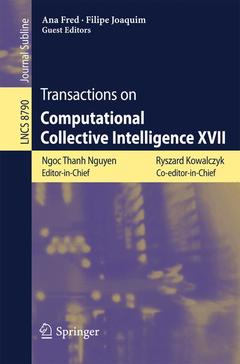Description
Transactions on Computational Collective Intelligence XVII, 2014
Transactions on Computational Collective Intelligence Series
Coordinators: Nguyen Ngoc Thanh, Kowalczyk Ryszard, Fred Ana, Joaquim Filipe
Language: English
Keywords
agent-based modeling; agent-based simulation; algorithm; auctions; cognition; computational finance; computational linguistics; context; databases; finite automata; formal linguistics; formal models; genetic algorithms; grammar inference; knowledge management; meta-heuristics; multiagent system; natural languages; neural networks; opinion mining; optimization; situation semantics; software agents; subset-based and colony optimization
295 p. · 15.5x23.5 cm · Paperback
Description
/li>Contents
/li>Comment
/li>
Multiagent Methodology to Reduce the Bullwhip Effect in a Supply Chain.- Behavioural Investigations of Financial Trading Agents using Exchange Portal.- An Overview of the Interrelation among Agent Systems, Learning Models and Formal Languages.- An Agent-Based Approach for Accident Analysis in Safety Critical Domains: A Case Study on a Runway Incursion Incident.- Inference of Markov chain models by using k-Testable Language: Application on aging people.- Finite Automata with Translucent Letters applied in Natural and Formal Language Theory.- Distributed Evacuation Route Planning Using Mobile Agents.- Situation Theory, Situated Information, and Situated Agents.- Conditional Preference Networks Support Multi-Issue Negotiations with Mediator.- Genetic Algorithm and Firefly Algorithm Hybrid Schemes for Cultivation Processes Modelling.- Color Quantization with Magnitude Sensitive Competitive Learning Algorithm.- A Subset-Based Ant Colony Optimisation with Tournament Path Selection for High-Dimensional Problems.- An Analysis of the Local Optima Storage Capacity of Hopfield Network Based Fitness Function Models.- On the Alzheimer’s disease diagnosis: automatic spontaneous speech analysis.- Synthesis of Multicomponent Reuse Water Networks by PSO Approach.
Includes supplementary material: sn.pub/extras




